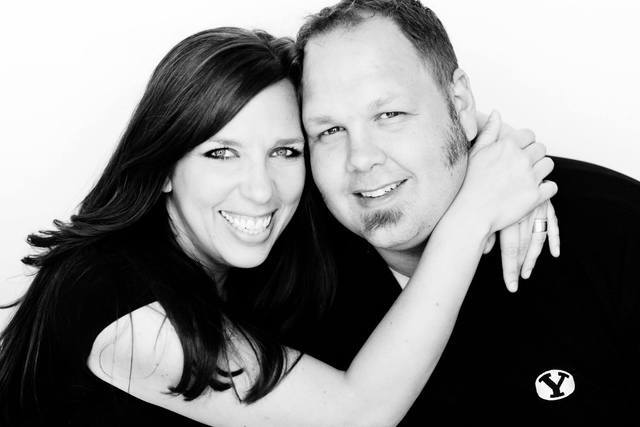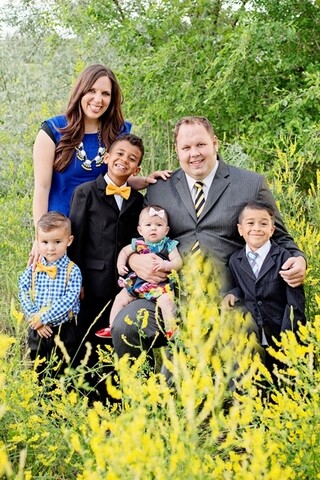My most painful experiences so far in mortality are centered around the struggle to grow my family. All the feelings rush in when I think about it—images of the horrific testing with hopeless results, the battle to fit in at family and church gatherings, burying the dream of feeling a baby grow inside me and the nightmare of adoptions that didn’t work out.
I remember asking my father-in-law for a priesthood blessing, just a few weeks after initially learning we were sterile. I listened with my heart wide open to the words he shared. Among other very sacred things, he told me that I needed to be prepared when I walked into church meetings, as there would be people who would say insensitive things. He encouraged me to forgive them as quickly as I could because they simply didn’t understand and couldn’t comprehend the agony we were in. He reminded me that I have a choice as to whether or not I would be offended.
That was a decade ago and I have not forgotten that powerful message. As hard as it is for me to admit, I still prepare myself before I go to church. It’s been a long process, but gone are the days when I want to run from a meeting and sob in the bathroom stall. Don’t get me wrong, there are still words that sting, but I am in a brighter place now. Through the reality of the Atonement and a lot of hard work, I am no longer in the dark fog of grief, actively mourning my infertility.
Did you know that according to the Centers for Disease Control and Prevention, 1 in 8 couples deal with infertility? It’s probably more common in your ward family than you think. But, it’s so personal and so painful that most folks aren’t super open about it. And although it can feel like you’re wearing a “scarlet letter” of infertility if you don’t have a child entourage walking in with you to sacrament meeting, it’s not always obvious. I’m hoping that by sharing a sprinkle of information and a dash of context, you’ll understand this painful part of our journey a little more.
In the dark, isolating hopelessness of infertility, sometimes what you say to us isn’t what we hear. Sometimes what someone might say, with the intention of helping, can actually hurt. Here are five common conversations that occur within the Church and how they can sometimes be misinterpreted, along with a few ways you can show more love to families working through infertility issues.
When we were new in the ward and you started a conversation in the church foyer:
What you said: Do you have children yet? No? How long have you been married?
What we may hear: I am sizing you up. No children yet/only one child and you've been married how long? What's wrong with you? Don’t you like children? Children must not be important to you.
What you may really mean: I'm trying to get to know you and your family and see how I can serve you.
What you may consider saying instead: Welcome! Tell me about yourself and your family. My family would love to get to know yours.
“People can be very judgmental and it was often hurtful. People who knew us and our situation were understanding, but others would often ask, ‘How many children do you have?’ When I responded, ‘One, and we’re so thankful for her,’ they often looked surprised. Maybe this is rude, but if people started to pry I’d just tell them that it was none of their business. Even with one child, I heard comments like, ‘When will you have a family?’ I do have a family!”
—Sister Ruth Renlund

When I opened up to you during a ministering visit about our struggle to get pregnant:
What you said: You would get pregnant if you just had more faith.
What we may hear: I’m judging your faith. I have six kids so I have more faith than you. Your lack of spiritual knowledge is why you aren’t pregnant yet.
What you may really mean: We can have faith in God. He wants to bless us. I am just trying to help.
What you may consider saying instead: I’m so sorry and I love you. I don’t know what to say or how to help, but I will be praying for you.
“The idea that all suffering is somehow the direct result of sin has been taught since ancient times. It is false doctrine. That notion was even accepted by some of the early disciples until the Lord corrected them. ‘As Jesus passed by, he saw a man which was blind from his birth. ‘And his disciples asked him, saying, Master, who did sin, this man, or his parents, that he was born blind? ‘Jesus answered, Neither hath this man sinned, nor his parents: but that the works of God should be made manifest in him’ (John 9:1–3). ... Afflictions come to the innocent.”
—President Boyd K. Packer
When we were chatting about your kiddos before class started:
What you said: I shouldn’t be talking to you about this. You don’t have kids and probably wouldn’t understand.
What we may hear: I can’t be your friend or at least as close of a friend because I have kids and you don’t.
What you may really mean: I’m not sure how to relate to you in this situation, or if you will even be interested in this topic.
What you may consider saying instead: I don't want to make you feel bad because I know children are a sensitive/painful topic for you. However, I’d love to get some advice about my son, if you’re up for it. I could use your perspective.
“Brothers and sisters, we need each other! As covenant-keeping women and men, we need to lift each other and help each other become the people the Lord would have us become. And we need to work together to lift the rising generation and help them reach their divine potential as heirs of eternal life.” —Sister Linda K. Burton
When you shared your testimony last month:
What you said: I’m so glad Heavenly Father trusts me enough to have kids.
What we may hear: Heavenly Father doesn’t trust you to have children, that’s why you’re infertile. He doesn’t trust you enough to be a mother or father.
What you may really mean: Parenting is hard work and a huge responsibility. I often feel inadequate, but I can feel Heavenly Father’s trust in me.
What you may consider saying instead: Even when parenting gets really hard, I’m thankful for my wonderful family. I know Heavenly Father is helping us in whatever hardships we are facing.
“I believe mother is one of those very carefully chosen words, one of those rich words—with meaning after meaning after meaning. We must not, at all costs, let that word divide us. I believe with all my heart that it is first and foremost a statement about our nature, not a headcount of our children. … Some women give birth and raise children but never ‘mother’ them. Others, whom I love with all my heart, ‘mother’ all their lives but have never given birth.”
—Sister Patricia Holland
During the lesson about family in Relief Society:
What you said: Bearing children is the most important thing a woman does.
What we may hear: You are not a real woman or a real mother unless you’ve given birth. Even if you have adopted, you are worth less than the mother sitting next to you because your body cannot create life.
What you may really mean: Womanhood is divine!
What you may consider saying: Bearing children as well as laboring over those children through a lifetime is a sacred part of womanhood, although it’s not the only definition of womanhood.
President Russell M. Nelson has taught, “It would be impossible to measure the influence that [covenant keeping] women have, not only on families but also on the Lord’s Church, as wives, mothers, and grandmothers; as sisters and aunts; as teachers and leaders; and especially as exemplars and devout defenders of the faith.” Every woman in every circumstance has divine worth.
“You see, it is not only that they bear us, but they continue bearing with us. It is not only the prenatal carrying but the lifelong carrying that makes mothering such a staggering feat.”
—Elder Jeffrey R. Holland

The reason why these situations can be so painful and have taught me how to forgive others is because the righteous yearning for parenthood burns within those of us who have infertility issues just as it does for those who can bear children. Not being able to make those parenthood dreams come true for ourselves and our spouse because of our mortal bodies can be devastating.
We agree with Elder Holland and know that “no love in mortality comes closer to approximating the pure love of Jesus Christ than the selfless love a devoted mother has for her child.” We just don’t have control over when and if those blessings will come our way in this life. Some even feel that the burden of infertility is too much to carry. We need someone to help strengthen our feeble knees and lift up our hands when they hang down. We need your love and your understanding.
“In the Church, we not only learn divine doctrine; we also experience its application. As the body of Christ, the members of the Church minister to one another in the reality of day-to-day life. All of us are imperfect; we may offend and be offended. We often test one another with our personal idiosyncrasies. In the body of Christ, we have to go beyond concepts and exalted words and have a real ‘hands-on’ experience as we “live together in love.” This religion is not only concerned with self.”
—Elder D. Todd Christofferson
Editor's note: This article was originally published on LDSLiving.com in May 2019.






